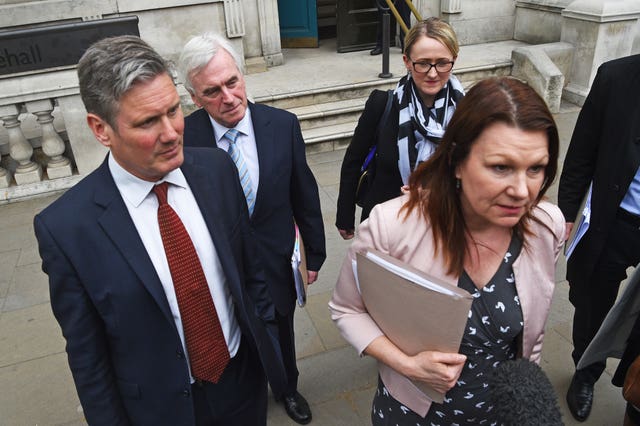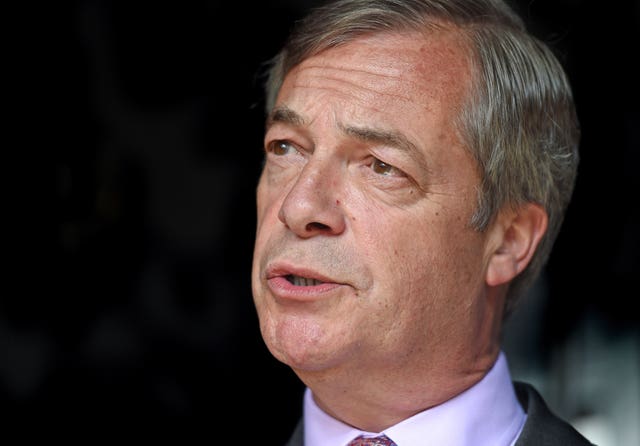Recriminations over collapse of May-Corbyn Brexit talks
Labour leader Jeremy Corbyn pulled the plug on the negotiations, but Theresa May blamed his party’s splits over a second referendum.

Theresa May and Jeremy Corbyn have clashed following the collapse of cross-party talks aimed at finding a Brexit compromise.
The Labour leader pulled the plug on negotiations after six weeks of talks, saying they had “gone as far as they can” and “we have been unable to bridge important policy gaps between us”.
Mr Corbyn also said the prospect of a change in Tory leadership meant the Government was “ever more unstable and its authority eroded” and Labour could not be confident in any cross-party agreement being delivered by her successor.
But the Prime Minister highlighted Labour’s own divisions over the issue of a second referendum, saying they had made it impossible for a deal to be reached.
Allies of Mrs May pointed the finger at shadow Brexit secretary Sir Keir Starmer, a key player in the negotiations, who has suggested that a deal would be unlikely to get through the Commons without a referendum attached.
Speaking at a European election campaign event in Bristol, Mrs May said: “There have been areas where we have been able to find common ground, but other issues have proved to be more difficult – and in particular we have not been able to overcome the fact that there isn’t a common position in Labour about whether they want to deliver Brexit or hold a second referendum which could reverse it.”
She suggested that the option of indicative Commons votes to find out what MPs would be prepared to accept remained under consideration ahead of the Withdrawal Agreement Bill (WAB) being brought to Parliament for a showdown in the week beginning June 3.
She said: “When we come to bring the legislation forward we will think carefully about the outcome of these talks, we’ll also consider whether we have some votes to see if the ideas that have come through command a majority in the House of Commons.
“But when MPs come to vote on the Bill they will be faced with a stark choice: that is to vote to deliver on the referendum, to vote to deliver Brexit or to shy away from delivering Brexit with all the uncertainty that that would leave.”
The Government will now focus its efforts on trying to win over rebel Tories and the DUP, while hoping that Labour MPs can be persuaded to back the WAB based on the common ground established during the talks on areas including workers’ rights and environmental protections.
The Prime Minister is due to set out the timetable for her exit from Number 10 following the vote on the WAB and candidates to replace her are already jostling for position.
Downing Street said it became clear on Thursday night that it would be impossible to reach a full deal with Labour.
In a letter to Mrs May, Mr Corbyn said: “I believe the talks between us about finding a compromise agreement on leaving the European Union have now gone as far as they can.”

Mr Corbyn, speaking in his north London constituency, said Mrs May had not moved her red lines “fundamentally” and the divisions in the Tory Party meant it is a “Government that is negotiating with no authority and no ability, that I can see, to actually deliver anything”.
The cross-party talks included discussions on whether to hold a series of indicative votes before the second reading of the WAB, designed to enable to UK to leave the EU before July 31, leaked documents revealed.
On the prospect of indicative votes, the Labour leader said: “This is a novel process which we will obviously look at whenever it comes to Parliament.”

The Prime Minister’s official spokesman said: “We have made real progress on some issues such as workers’ rights and environmental protections, but it is clear that we are not going to be able to reach a complete agreement.
“In particular there have been very challenging discussions in respect of the different positions of the two sides on customs and the holding of a second referendum.”
No further discussions are planned with the Opposition, the spokesman confirmed.

Brexit Party leader Nigel Farage said: “Jeremy Corbyn was never going to come to an agreement on this. Why would he help the Tory Party?”
He claimed Labour was now “95% of the way towards being a second referendum party”.
Brexiteer former international development secretary Priti Patel tweeted: “Many of us did question the judgment of the Cabinet when they approved those talks.”
The failure to reach agreement was met with despair from business leaders, with the CBI calling on MPs to cancel the recess planned for the end of May.
CBI director-general Carolyn Fairbairn said: “Another day of failed politics, another dispiriting day for British business.
“Six wasted weeks while uncertainty paralyses our economy.”
Mrs May was campaigning in Bristol ahead of next week’s European elections, where the Tories are braced for a backlash from voters angry at her inability to deliver Brexit.

But she said: “No-one else can get the job done. Labour, the Lib Dems and SNP have voted against delivering Brexit again and again.
“Nigel Farage can’t deliver Brexit: every few years he pops up, he shouts from the sidelines, he doesn’t work constructively in the national interest.”





